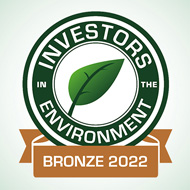BSAVA scoops prestigious environmental award

"This is a first step on the road to greater sustainability for BSAVA" - Amanda Stranack, BSAVA CEO.
The BSAVA has earned an Investors in the Environment (iiE) Bronze award.
The iiE scheme is designed to help businesses reduce their impact on the environment, save money and time, and get promoted for their green credentials.
BSAVA has been working to reduce its environmental impact by printing its publications with sustainability in mind and documenting how resources are used at its head office. The Association has also taken steps to reduce the environmental impact of its annual Congress event and contributed to the development of the VetSustain Carbon Calculator.
The work is thanks to BSAVA's Sustainability Working Group (SWG), which was set up in 2020 by a dedicated team of staff and volunteers. The group made it their mission to explore the feasibility of BSAVA becoming carbon neutral as an organisation, both at BSAVA's HQ (Woodrow House) and association-wide.
SWG chair Carl Gorman commented: “I’m pleased that the concerted efforts that BSAVA have been making for sustainable working have been rewarded with our iiE Bronze award. We will continue our drive towards not only carbon-neutral status but enhancing all areas of sustainability for BSAVA and the veterinary profession. A prime example is our commitment to making Congress 2023 carbon neutral.
BSAVA CEO Amanda Stranack added: “‘I would like to congratulate the Sustainability Working Group and all the staff who contributed to achieving this accreditation. This is a first step on the road to greater sustainability for BSAVA and has provided good insight into what we have achieved so far but also where the future opportunities to reduce our impact lie.”



 The Veterinary Medicines Directorate (VMD) is inviting applications from veterinary students to attend a one-week extramural studies (EMS) placement in July 2026.
The Veterinary Medicines Directorate (VMD) is inviting applications from veterinary students to attend a one-week extramural studies (EMS) placement in July 2026.